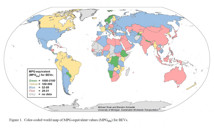As popular as electric cars and hybrids have become, one of the main questions surrounding them remains: “Are we still emitting the same greenhouse gasses, just in a different way?” Is it like moving things around a desk, with the same result in the end? Taking into account that electricity can come from a variety of sources – hydroelectric, nuclear, and coal, to name a few – do electric vehicles or hybrids achieve any meaningful reduction in their carbon footprint?
Recently, Michael Sivak, director of Sustainable Worldwide Transportation at the University of Michigan, and Brandon Schoettle, project manager at the University of Michigan’s Human Factors Group, addressed this question once and for all in their global report entitled Fuel Sources for Electricity in the Individual Countries of the World and the Consequent Emissions from Driving Electric Vehicles. With an aim to “evaluate the relative amounts of greenhouse-gas emissions from driving a battery-electric vehicle compared with greenhouse-gas emissions from driving a traditional gasoline-powered vehicle in different countries of the world,” they considered many factors, from material extraction to electricity distribution, and of course, the efficiency of the vehicles themselves.
The results provided a glowing view on the environmental benefits of electric vehicles in general, and especially ones driven in countries with largely emissions-free, sustainable energy sources. Electric vehicles driven by hydro power in particular rated highly: of the 143 sovereign states the study looked at, Albania – Albania! – finished atop the pile, as its electricity grid is run completely on hydroelectric power (similar to the electricity grids of BC and Quebec). As a result, the average BEV driven in that country only uses the equivalent of 0.05L/100 km of fuel in its production, transportation, and operation - the GHG equivalent of a vehicle achieving 5,100 miles per gallon.
Canada performed admirably, finishing with a 1.4 L/100 km figure, or the equivalent of a car achieving 169.5 MPG, good for 22nd overall in the world. The US finished with 4.2 L/100 km (55.4 MPG-GHG), 87th overall and behind Russia, Mexico, the United Kingdom and – wait for it – North Korea!
The worst offenders were Gibraltar, Botswana, Eritrea, South Sudan, and Niger, all with exclusively coal or oil-powered electricity grids, where BEVs emit the equivalent of 8.1 L/100 km (29 MPG-GHG). That's much worse than the study’s overall global average, which came in at 4.6 L/100 km (51.5 MPG-GHG).

